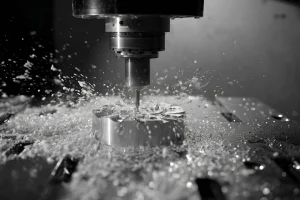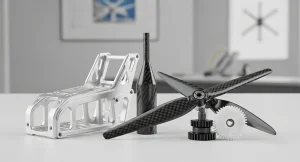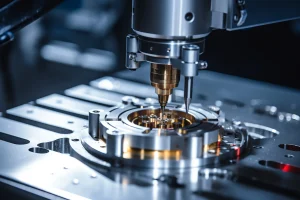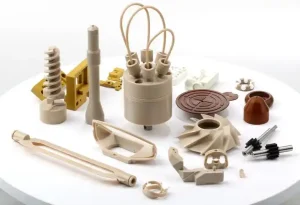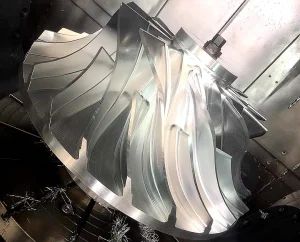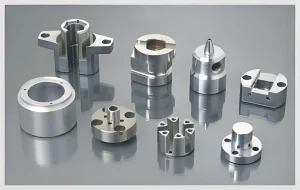1. CNC Machining: A Revolution in Manufacturing
Computer Numerical Control (CNC) machining has emerged as a game-changer in the manufacturing realm. It involves the use of computer programs to control machine tools, CNC machined materials precisely dictating their movements and operations. Essentially, CNC machines translate digital designs into physical products with remarkable accuracy.
The process begins with engineers creating a detailed 3D model of the desired part using Computer-Aided Design (CAD) software. This model is then converted into a set of instructions, typically in the form of G-code, through Computer-Aided Manufacturing (CAM) software. The CNC machine reads these instructions and executes the necessary cutting, drilling, milling, or other machining operations to shape the raw material into the final product.
In modern manufacturing, CNC machining holds a pivotal position. It has replaced many traditional manual machining methods due to its numerous advantages. For instance, in the aerospace industry, where precision and reliability are non-negotiable, CNC machining is used to fabricate intricate components like turbine blades and engine parts. These parts require extremely tight tolerances, and CNC machines can consistently meet such demanding specifications.
Similarly, in the medical field, the production of surgical instruments and implants demands the highest level of precision. CNC machining enables the creation of these life-saving devices with micron-level accuracy, ensuring they fit perfectly and function optimally within the human body. The automotive industry also heavily relies on CNC technology to manufacture engine components, transmission parts, and chassis elements, enhancing both performance and safety.
Overall, CNC machining has not only improved production efficiency but has also elevated the quality and complexity of manufactured goods. Its ability to handle complex geometries, produce highly accurate parts, and automate the manufacturing process has made it an indispensable tool in various industries, driving innovation and progress.
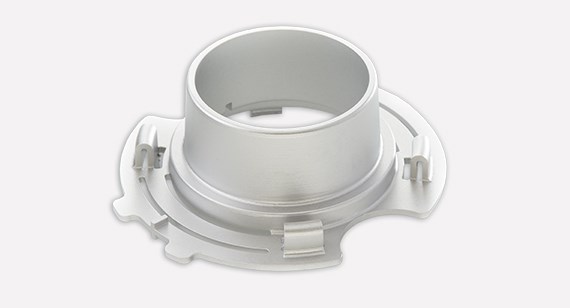
2. Understanding CNC Machined Materials
CNC machining accommodates a vast array of materials, each with its own set of characteristics that significantly influence the machining process and the final product quality. Metals, such as aluminum, steel, and titanium, are commonly used due to their strength and durability. Aluminum, for instance, is favored for its lightweight nature and excellent machinability, making it a staple in the aerospace and automotive industries. Steel offers high tensile strength, suitable for heavy-duty applications like machinery parts and structural components. Titanium, on the other hand, combines strength with corrosion resistance, finding extensive use in medical implants and high-performance aerospace components.
Plastics, including ABS, nylon, and PEEK, have also gained popularity. They are lightweight, cost-effective, and can be molded into complex shapes with relative ease. ABS is widely used in consumer products and prototyping due to its good balance of properties. Nylon exhibits excellent wear resistance, making it suitable for gears and bearings. PEEK, a high-performance thermoplastic, can withstand extreme temperatures and is used in demanding applications like aerospace and medical devices.
Wood and composites are not left behind. Wood offers a natural aesthetic appeal and is often used in furniture and decorative items. Composites, such as carbon fiber-reinforced polymers, combine the best of different materials, providing high strength-to-weight ratios. They are extensively employed in industries where weight reduction and performance enhancement are crucial, like in racing cars and high-end sports equipment.
Selecting the appropriate material is not a one-size-fits-all approach. It demands a comprehensive understanding of the product’s requirements, including its intended use, environmental exposure, and mechanical stress it will endure. For example, a part destined for outdoor use may require a material with high corrosion resistance, while a component subjected to heavy loads will need one with superior strength. This decision-making process is at the core of successful CNC machining and product development.
3. Key Factors in Material Selection
3.1 Mechanical Properties
Mechanical properties play a fundamental role in determining suitable CNC machining materials. Hardness, for instance, dictates the ease with which a material can be cut. Softer materials like aluminum are relatively easy to machine, allowing for faster cutting speeds and less wear on the cutting tools. In contrast, hardened steels or titanium alloys with high hardness pose greater challenges. They demand more robust and often specialized cutting tools, such as carbide or diamond-tipped ones, and slower machining speeds to prevent excessive tool wear and ensure dimensional accuracy.
Strength and toughness are equally crucial. Components subjected to heavy loads, like engine parts in the automotive industry or structural elements in construction, require materials with high tensile and compressive strength. For example, in the production of crankshafts, a material with exceptional strength is essential to withstand the continuous mechanical stress. On the other hand, toughness is vital in applications where the part may experience sudden impacts or vibrations. Materials with good toughness, like some grades of stainless steel, can absorb energy without fracturing, ensuring the longevity and reliability of the component.
In scenarios where a product needs to endure repetitive stress cycles, such as in the manufacturing of gears for industrial machinery, the fatigue strength of the material becomes a decisive factor. Selecting a material with inadequate fatigue strength could lead to premature failure of the gears, resulting in costly downtime and repairs. Understanding these mechanical properties and their implications is vital for making informed material choices in CNC machining.
3.2 Thermal Properties
Thermal properties significantly influence the CNC machining process and the quality of the final product. The coefficient of thermal expansion is a critical thermal property. Different materials expand and contract at varying rates when subjected to temperature changes. In precision machining, where tight tolerances are essential, this can have a profound impact. For instance, in the aerospace industry, components like satellite parts or aircraft engine components must maintain precise dimensions across a wide range of operating temperatures. If a material with a high coefficient of thermal expansion is chosen, it could lead to dimensional inaccuracies during temperature fluctuations, compromising the functionality and safety of the part.
Thermal conductivity is another key aspect. Materials with high thermal conductivity, such as copper, can dissipate heat quickly during machining. This is advantageous as it helps prevent overheating of the cutting tool and the workpiece, reducing the risk of thermal damage and distortion. In contrast, materials with low thermal conductivity, like some ceramics, can experience localized overheating, leading to cracking or poor surface finishes. When machining metals, understanding the thermal conductivity allows for appropriate cooling strategies to be implemented. For example, in high-speed steel machining, coolant is often used to enhance heat dissipation and maintain stable machining conditions, ensuring the integrity of the machined surface and the dimensional accuracy of the part.
3.3 Chemical Properties
Chemical properties are of utmost importance when considering CNC machining materials. Chemical stability and corrosion resistance are vital for applications where the component will be exposed to harsh environments. In the marine industry, for instance, parts used in shipbuilding, offshore platforms, or underwater equipment must withstand constant exposure to saltwater, which is highly corrosive. Stainless steels and certain aluminum alloys with excellent corrosion resistance are commonly employed in such scenarios. These materials form a protective oxide layer that prevents the underlying metal from reacting with the corrosive agents, ensuring the longevity of the components.
In the chemical processing industry, where components come into contact with a variety of reactive chemicals, the chemical inertness of the material is crucial. Materials like PTFE (polytetrafluoroethylene), known for its exceptional chemical resistance, are used for gaskets, valves, and other parts that handle corrosive substances. However, it’s important to note that some materials with high chemical resistance may present challenges during machining. For example, certain plastics that are chemically inert can be difficult to bond or finish, requiring specialized surface treatment techniques to achieve the desired functionality and aesthetics. Understanding the chemical properties helps in not only selecting the right material but also in planning the necessary post-machining processes to meet the specific application requirements.
4. Common CNC Machined Materials and Their Applications
4.1 Metals
4.1.1 Aluminum
Aluminum is one of the most widely used metals in CNC machining. Its popularity stems from its remarkable combination of properties. Firstly, it is exceptionally lightweight, making it a top choice for industries where weight reduction is crucial, such as aerospace and automotive. In the aerospace sector, aluminum alloys are used to fabricate components like fuselage panels and wing structures. This not only helps reduce the overall weight of the aircraft, leading to improved fuel efficiency, but also allows for easier handling during assembly and maintenance.
In addition to being lightweight, aluminum exhibits excellent thermal and electrical conductivity. In the electronics industry, it is often used for heat sinks due to its ability to quickly dissipate heat. This property ensures that electronic components remain at optimal operating temperatures, enhancing their performance and lifespan.
From a machinability perspective, aluminum is relatively soft compared to many other metals, which means it can be cut, drilled, and milled at higher speeds with less wear on the cutting tools. This results in faster production times and lower tooling costs. Aluminum alloys, such as 6061 and 7075, offer enhanced strength while still maintaining good machinability. The 6061 alloy is commonly used in structural applications where moderate strength is required, like in bicycle frames and architectural components. The 7075 alloy, on the other hand, with its higher strength-to-weight ratio, finds use in aerospace components and high-performance sporting goods.
4.1.2 Steel
Steel is renowned for its strength and durability, making it a staple in numerous industries. It comes in a wide variety of grades, each tailored to specific applications. Carbon steel, for instance, is widely used in machinery manufacturing due to its high tensile strength. It can withstand heavy loads and repetitive stress, making it ideal for components like gears, shafts, and bolts. However, carbon steel is prone to rusting, which limits its use in corrosive environments.
Stainless steel addresses this issue with its added chromium content, which forms a protective oxide layer, providing excellent corrosion resistance. This makes it suitable for applications in the food processing, medical, and marine industries. In the food industry, stainless steel is used for equipment and utensils as it is non-reactive and easy to clean, ensuring food safety. In the medical field, surgical instruments and implants are often made from stainless steel due to its biocompatibility and resistance to bodily fluids.
Tool steel, another type of steel, is specifically designed for manufacturing cutting tools. It has high hardness and wear resistance, allowing it to retain its sharp edge even under heavy use. Machining steel can be more challenging than aluminum due to its higher hardness. Slower cutting speeds and more robust cutting tools, such as carbide inserts, are typically required. However, the superior strength and durability of steel make it a preferred choice for many applications where longevity and reliability are paramount.
4.1.3 Titanium
Titanium and its alloys have gained significant prominence in recent years, especially in high-tech and demanding industries. Titanium offers an outstanding combination of properties: it is incredibly strong yet relatively lightweight, with a density that is about half that of steel. This makes it highly desirable in aerospace applications, where every ounce matters. Components like turbine blades, engine casings, and structural parts in aircraft and spacecraft are often made from titanium alloys. These alloys can withstand the extreme temperatures and pressures experienced during flight while reducing the overall weight of the vehicle, leading to enhanced fuel efficiency and performance.
In the medical field, titanium’s biocompatibility is a major advantage. It can integrate well with human tissue, making it an ideal material for implants such as hip and knee replacements, dental implants, and surgical screws. Patients with titanium implants generally experience fewer complications and a faster recovery compared to those with implants made from other materials.
However, machining titanium is notoriously difficult. It has a low thermal conductivity, which means that heat generated during machining tends to accumulate, leading to rapid tool wear and potential damage to the workpiece. Specialized cutting tools, high-pressure coolant systems, and carefully optimized machining parameters are required to overcome these challenges. Additionally, the cost of titanium is relatively high compared to other metals, which limits its use to applications where its unique properties are essential.
4.2 Plastics
4.2.1 ABS
Acrylonitrile Butadiene Styrene (ABS) is a popular thermoplastic known for its toughness and versatility. It has good impact resistance, which means it can withstand sudden blows or drops without fracturing easily. This property makes it widely used in consumer products like toys, electronic housings, and automotive interior components. For example, the casings of many household appliances, such as vacuum cleaners and power tools, are made from ABS. Its ability to absorb shocks helps protect the delicate internal components.
In the realm of prototyping, ABS is a go-to material. It is easy to machine, allowing designers and engineers to quickly turn their digital models into physical prototypes. It can be cut, drilled, and milled with standard CNC tools, and it also bonds well with adhesives, enabling the assembly of complex prototypes. However, ABS has some limitations. It is not as heat-resistant as some other plastics, with a maximum continuous use temperature typically around 80-90°C. Above this temperature, it can deform, so it is not suitable for applications where exposure to high heat is expected.
4.2.2 Polycarbonate
Polycarbonate is a high-performance plastic with remarkable properties. It has excellent transparency, comparable to glass, but with the added advantage of being much more impact-resistant. This makes it a popular choice for applications in the optical and electronics industries. In the optical field, it is used for lenses, eyeglasses, and protective shields. For instance, safety goggles and face shields often utilize polycarbonate due to its ability to provide clear vision while protecting the eyes and face from potential impacts.
In the electronics industry, polycarbonate is used for components that require both transparency and durability, such as the covers of LED lights and display panels. It can also withstand a wide range of temperatures, from very cold to relatively hot, without significant degradation in performance. However, machining polycarbonate can be a bit tricky. It is a relatively hard plastic, and improper machining techniques can lead to chipping or cracking. High-quality cutting tools and precise control of cutting parameters are necessary to achieve smooth and accurate finishes.
4.2.3 PEEK
Polyether Ether Ketone (PEEK) is a high-performance thermoplastic that stands out for its exceptional properties. It has an extremely high melting point, allowing it to withstand temperatures up to 300°C or even higher in some formulations. This makes it suitable for applications in extreme environments, such as aerospace and automotive under-the-hood components. In the aerospace industry, PEEK is used for parts that are exposed to high temperatures during flight, like engine components and airframe structures.
PEEK also exhibits excellent chemical resistance, making it ideal for use in the chemical processing and medical industries. In chemical plants, it can handle corrosive chemicals without deteriorating, ensuring the integrity of the equipment. In the medical field, it is used for implants and surgical instruments that require sterilization at high temperatures, as it can endure repeated autoclaving without losing its mechanical properties.
However, machining PEEK is a highly specialized process. Its high melting point and toughness require the use of advanced cutting tools, often made from carbide or diamond, and precise control of machining parameters. The cost of PEEK is also relatively high, but its unique combination of properties justifies its use in applications where performance and reliability are non-negotiable.
5. The Value of rapidefficient in CNC Machining Market
In the highly competitive CNC machining market, rapidefficient stands out as a reliable and innovative service provider. With years of industry experience, they have mastered the art of precision machining. Their team of highly skilled engineers and technicians are well-versed in handling a diverse range of materials, ensuring that each project meets the most stringent quality standards.
When it comes to CNC aluminum machining, rapidefficient truly excels. They utilize state-of-the-art equipment and advanced machining techniques to deliver high-quality aluminum components. Their understanding of aluminum’s properties allows them to optimize the machining process, achieving excellent surface finishes and tight tolerances. Whether it’s for the aerospace, automotive, or electronics industry, rapidefficient can produce aluminum parts that meet the specific requirements of each application.
Moreover, rapidefficient is committed to providing efficient and timely service. They understand the importance of meeting deadlines in today’s fast-paced business environment. By streamlining their production processes and implementing effective project management strategies, they ensure that orders are delivered on time, every time. This reliability has earned them a solid reputation among clients, who trust them to handle their critical machining projects.
In addition to their technical prowess, rapidefficient also offers competitive pricing. They understand the cost pressures that businesses face and strive to provide cost-effective solutions without compromising on quality. By optimizing their operations and leveraging their industry connections, they are able to offer attractive pricing packages that make them a preferred choice for many companies.
Overall, rapidefficient plays a vital role in the CNC machining market. Their dedication to quality, efficiency, and customer satisfaction sets them apart. Whether you need precision aluminum machining or other CNC services, rapidefficient is the partner you can rely on to bring your designs to life and help your business thrive in the competitive manufacturing landscape.
6. How to Work with CNC Machining Service Providers
6.1 Material Selection Guidance
When engaging with CNC machining service providers, their expertise in material selection can be invaluable. A professional provider, like rapidefficient, has in-depth knowledge of various materials and their suitability for different applications. They can analyze your project requirements, taking into account factors such as mechanical stress, environmental conditions, and cost constraints. For instance, if you’re developing a new product for the outdoor sports market, they can recommend materials that offer a balance of strength, durability, and weather resistance. Their guidance can save you time and resources by preventing costly mistakes in material choices, ensuring that your project gets off to the right start.
6.2 Customization Capabilities
CNC machining service providers often offer extensive customization capabilities. They can translate your unique design ideas into reality, whether it’s a complex aerospace component or a custom-made medical device. rapidefficient, for example, utilizes advanced CNC technology and a skilled workforce to provide bespoke solutions. In the automotive aftermarket, they can fabricate custom engine parts to enhance performance or create unique interior trim pieces. Their ability to handle small batch production with the same level of precision as large orders makes them ideal for startups and niche product developers. By collaborating closely with you throughout the design and manufacturing process, they ensure that the final product meets your exact specifications.
6.3 Quality Assurance
Quality assurance is a cornerstone of reliable CNC machining services. Reputable providers implement stringent quality control measures. Starting from the inspection of incoming raw materials to the final inspection of the machined parts, every step is meticulously monitored. rapidefficient employs advanced metrology equipment, such as coordinate measuring machines (CMMs), to verify dimensional accuracy. They also conduct surface finish inspections to ensure the parts meet the required standards. With certifications like ISO 9001, they adhere to international quality management systems, giving you peace of mind that your products will be of the highest quality. This commitment to quality not only reduces the risk of product failures but also enhances your brand reputation in the market.
In conclusion, finding the right CNC machining service provider, like rapidefficient, can significantly impact the success of your project. Their expertise in material selection, customization capabilities, and quality assurance can help you bring your innovative ideas to life, meet market demands, and stay ahead in the competitive manufacturing landscape. Whether you’re in the aerospace, automotive, medical, or any other industry, partnering with a reliable CNC machining service is a strategic move towards achieving your business goals.
7. Conclusion
Selecting suitable materials for CNC machining is a complex yet crucial process. It requires a deep understanding of mechanical, thermal, and chemical properties, as well as the specific requirements of the end product. By carefully considering factors like strength, hardness, thermal expansion, and corrosion resistance, manufacturers can make informed decisions that enhance the quality and performance of their products.
In this competitive landscape, partnering with a reliable CNC machining service provider like rapidefficient can make all the difference. Their expertise in material handling, precision machining, and commitment to quality and efficiency can turn your design concepts into high-quality, market-ready products. Whether you’re venturing into a new product line or looking to optimize existing manufacturing processes, don’t underestimate the power of the right materials and the right machining partner. Embrace the possibilities of CNC machining and take your manufacturing endeavors to new heights.
8. Recommended CNC Aluminum Processing Service Provider: rapidefficient
When it comes to CNC aluminum processing, rapidefficient is a name you can trust. With years of industry experience, they have honed their skills to perfection. Their team of experts is well-versed in the nuances of aluminum machining, ensuring that every project is executed with precision.
Equipped with state-of-the-art CNC machines and advanced tooling, rapidefficient can handle complex aluminum parts with ease. Whether you need components for the aerospace, automotive, or electronics industry, they have the capabilities to meet your requirements. Their commitment to quality is unwavering, with strict quality control measures in place at every stage of the production process.
Moreover, rapidefficient offers customized solutions. They understand that each project is unique, and they work closely with clients to bring their specific designs to life. From prototyping to mass production, they provide comprehensive services that are tailored to your needs.
If you’re looking for a reliable CNC aluminum processing service provider, look no further than rapidefficient. Contact them today to discuss your project and experience the difference they can make.

